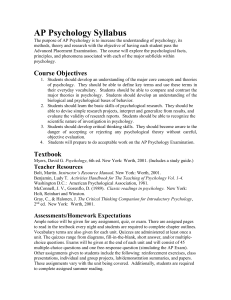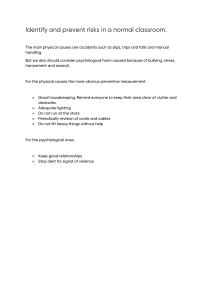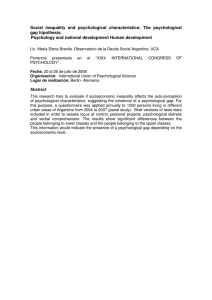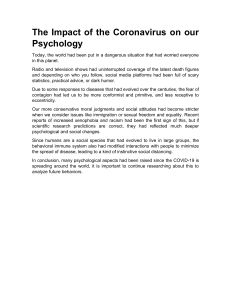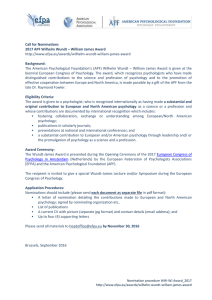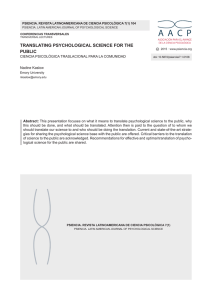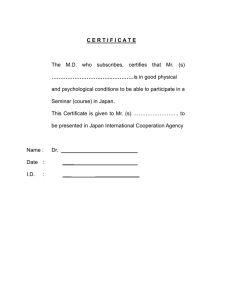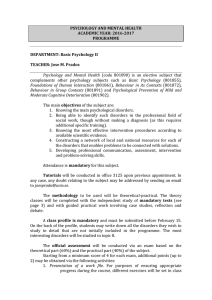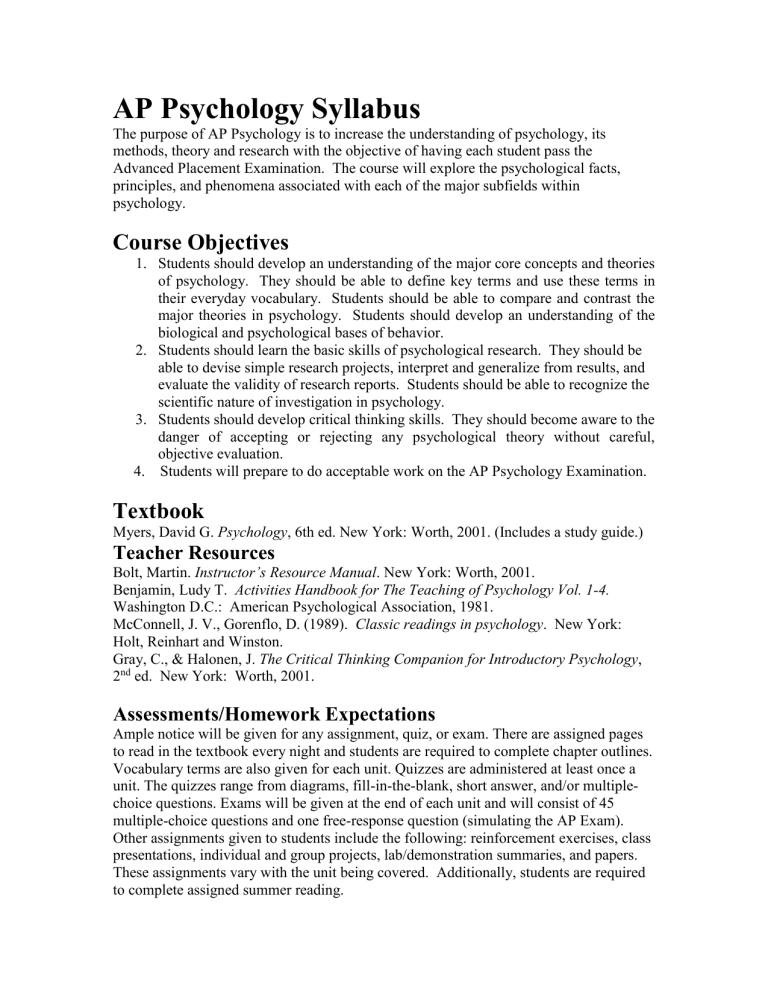
AP Psychology Syllabus The purpose of AP Psychology is to increase the understanding of psychology, its methods, theory and research with the objective of having each student pass the Advanced Placement Examination. The course will explore the psychological facts, principles, and phenomena associated with each of the major subfields within psychology. Course Objectives 1. Students should develop an understanding of the major core concepts and theories of psychology. They should be able to define key terms and use these terms in their everyday vocabulary. Students should be able to compare and contrast the major theories in psychology. Students should develop an understanding of the biological and psychological bases of behavior. 2. Students should learn the basic skills of psychological research. They should be able to devise simple research projects, interpret and generalize from results, and evaluate the validity of research reports. Students should be able to recognize the scientific nature of investigation in psychology. 3. Students should develop critical thinking skills. They should become aware to the danger of accepting or rejecting any psychological theory without careful, objective evaluation. 4. Students will prepare to do acceptable work on the AP Psychology Examination. Textbook Myers, David G. Psychology, 6th ed. New York: Worth, 2001. (Includes a study guide.) Teacher Resources Bolt, Martin. Instructor’s Resource Manual. New York: Worth, 2001. Benjamin, Ludy T. Activities Handbook for The Teaching of Psychology Vol. 1-4. Washington D.C.: American Psychological Association, 1981. McConnell, J. V., Gorenflo, D. (1989). Classic readings in psychology. New York: Holt, Reinhart and Winston. Gray, C., & Halonen, J. The Critical Thinking Companion for Introductory Psychology, 2nd ed. New York: Worth, 2001. Assessments/Homework Expectations Ample notice will be given for any assignment, quiz, or exam. There are assigned pages to read in the textbook every night and students are required to complete chapter outlines. Vocabulary terms are also given for each unit. Quizzes are administered at least once a unit. The quizzes range from diagrams, fill-in-the-blank, short answer, and/or multiplechoice questions. Exams will be given at the end of each unit and will consist of 45 multiple-choice questions and one free-response question (simulating the AP Exam). Other assignments given to students include the following: reinforcement exercises, class presentations, individual and group projects, lab/demonstration summaries, and papers. These assignments vary with the unit being covered. Additionally, students are required to complete assigned summer reading. Course-Long Plan Unit I: History, Approaches and Research Methods -- 3 weeks A. Logic, Philosophy, and History of Science B. Approaches/Perspectives [CR1] C. Experimental, Correlation, and Clinical Research D. Statistics [CR2] E. Research Methods and Ethics [CR16] CR1—The course provides instruction in history and approaches. CR2—The course provides instruction in research methods. Objectives • Define psychology and trace its historical development. CR16—The course provides instruction in • Compare and contrast the psychological perspectives. ethics and research • Identify basic and applied research subfields of psychology. methods used in psychological science • Identify basic elements of an experiment (variables, groups, sampling, and practice. population, etc.). • Compare and contrast research methods (case, survey, naturalistic observation). • Explain correlational studies. • Describe the three measures of central tendency and measures of variation. • Discuss the ethics of animal and human research. Unit II: Biological Basis of Behavior [CR3] -- 3 weeks A. Physiological Techniques (e.g., imaging, surgical) B. Neuroanatomy C. Functional Organization of Nervous System D. Neural Transmission E. Endocrine System F. Genetics CR3—The course provides instruction in biological bases of behavior. Objectives • Describe the structure of a neuron and explain neural impulses. • Describe neuron communication and discuss the impact of neurotransmitters. • Classify and explain major divisions of the nervous system. • Describe the functions of the brain structures (thalamus, cerebellum, limbic system, etc.). • Identify the four lobes of the cerebral cortex and their functions. • Discuss the association areas. • Explain the split-brain studies. • Describe the nature of the endocrine system and its interaction with the nervous system. Unit III: Developmental Psychology [CR9] -- 3 weeks A. Life-Span Approach B. Research Methods C. Heredity–Environment Issues D. Developmental Theories E. Dimensions of Development F. Sex Roles, Sex Differences CR9—The course provides instruction in developmental psychology. Objectives • Discuss the course of prenatal development. • Illustrate development changes in physical, social, and cognitive areas. • Discuss the effect of body contact, familiarity, and responsive parenting on attachment(Ainsworth, Harlowe, Lorenz). • Describe the benefits of a secure attachment and the impact of parental neglect and separation as well as day care on childhood development. • Describe the theories of Piaget, Erikson, and Kohlberg. • Describe the early development of a self-concept. • Distinguish between longitudinal and cross-sectional studies. [CR15] Unit IV: States of Consciousness [CR5] -- 2 weeks A. Sleep and Dreaming B. Hypnosis C. Psychoactive Drug Effects CR15—The course provides instruction in empirically supported psychological facts, research findings, terminology, associated phenomena, major figures, perspectives, and psychological experiments. CR5—The course provides instruction in states of consciousness. Objectives • Describe the cyclical nature and possible functions of sleep. • Identify the major sleep disorders. • Discuss the content and possible functions of dreams. • Discuss hypnosis, noting the behavior of hypnotized people and claims regarding its uses. • Discuss the nature of drug dependence. • Chart names and effects of depressants, stimulants, and hallucinogenic drugs. • Compare differences between NREM and REM. • Describe the physiological and psychological effects of depressants, stimulants, and hallucinogens. [CR15] CR15—The course provides instruction in empirically supported psychological facts, research findings, terminology, associated phenomena, major figures, perspectives, and psychological experiments. Unit V: Sensation & Perception [CR4] -- 3 weeks A. Thresholds B. Sensory Mechanisms C. Sensory Adaptation D. Attention E. Perceptual Processes CR4—The course provides instruction in sensation and perception. Objectives • Contrast the processes of sensation and perception. • Distinguish between absolute and difference thresholds. • Label a diagram of the parts of the eye and ear. • Describe the operation of the sensory systems (five senses). • Explain the Young-Helmholtz and opponent-process theories of color vision. • Explain the place and frequency theories of pitch perception. • Discuss Gestalt psychology’s contribution to our understanding of perception. • Discuss research on depth perception and cues. [CR15] CR15—The course provides instruction in empirically supported psychological facts, research findings, terminology, associated phenomena, major figures, perspectives, and psychological experiments. Unit VI: Learning [CR6] -- 2 weeks A. Classical Conditioning B. Operant Conditioning C. Cognitive Processes in Learning D. Biological Factors E. Social Learning (Observational Learning) Objectives • Describe the process of classical conditioning (Pavlov’s experiments). • Explain the processes of acquisition, extinction, spontaneous recovery, generalization, and discrimination. • Describe the process of operant conditioning, including the procedure of shaping, as demonstrated by Skinner’s experiments. • Identify the different types of reinforcers and describe the schedules of reinforcement. • Discuss the importance of cognitive processes and biological predispositions in conditioning. • Discuss the effects of punishment on behavior. • Describe the process of observational learning (Bandura’s experiments). Unit VII: Memory -- 2 weeks A. Memory Objectives • Describe memory in terms of information processing, and distinguish among sensory memory, short-term memory, and long-term memory. • Distinguish between automatic and effortful processing. • Explain the encoding process (including imagery, organization, etc.). • Describe the capacity and duration of long-term memory. • Distinguish between implicit and explicit memory. • Describe the importance of retrieval cues. • Discuss the effects of interference and motivated forgetting on retrieval. • Describe the evidence for the constructive nature of memory. CR6—The course provides instruction in learning. Unit VIII: Thinking and Language -- 2 weeks A. Language B. Thinking C. Problem Solving and Creativity [CR7] CR7—The course provides instruction in cognition. Objectives • Describe the nature of concepts and the role of prototypes in concept formation. • Discuss how we use trial and error, algorithms, heuristics, and insight to solve problems. • Explain how the representativeness and availability heuristics influence our judgments. • Describe the structure of language (phonemes, morphemes, grammar). • Identify language developmental stages (babbling, one word, etc.). • Explain how the nature-nurture debate is illustrated in the theories of language development. • Discuss Whorf’s linguistic relativity hypothesis. • Describe the research on animal cognition and communication. Unit IX: Motivation and Emotion [CR8] -- 2 weeks A. Biological Bases B. Theories of Motivation C. Hunger, Thirst, Sex, and Pain D. Social Motives E. Theories of Emotion F. Stress CR8—The course provides instruction in motivation and emotion. Objectives • Define motivation and identify motivational theories. • Describe the physiological determinants of hunger. • Discuss psychological and cultural influences on hunger. • Define achievement motivation, including intrinsic and extrinsic motivation. • Identify the three theories of emotion (James-Lange, Cannon-Bard, SchachterSinger). • Describe the physiological changes that occur during emotional arousal. • Discuss the catharsis hypothesis. • Describe the biological response to stress. Unit X: Testing and Individual Differences [CR11] -- 2 weeks A. Standardization and Norms B. Reliability and Validity C. Types of Tests D. Ethics and Standards in Testing E. Intelligence F. Heredity/Environment and Intelligence G. Human Diversity CR11—The course provides instruction in testing and individual differences. Objectives • Trace the origins of intelligence testing. • Describe the nature of intelligence. • Identify the factors associated with creativity. • Distinguish between aptitude and achievement tests. • Describe test standardization. • Distinguish between the reliability and validity of intelligence tests. • Describe the two extremes of the normal distribution of intelligence. • Discuss evidence for both genetic and environmental influences on intelligence. • Discuss whether intelligence tests are culturally biased. Unit XI: Personality [CR10] -- 2 weeks A. Personality Theories and Approaches B. Assessment Techniques C. Self-concept/Self-esteem D. Growth and Adjustment CR10—The course provides instruction in personality. Objectives • Describe personality structure in terms of the interactions of the id, ego, and superego. • Explain how defense mechanisms protect the individual from anxiety. • Describe the contributions of the neo-Freudians. • Explain how personality inventories are used to assess traits. • Describe the humanistic perspective on personality in terms of Maslow’s focus on self-actualization and Rogers’ emphasis on people’s potential for growth. • Describe the impact of individualism and collectivism on self-identity. • Describe the social-cognitive perspective on personality. • Discuss the consequences of personal control, learned helplessness, and optimism. Unit XII: Abnormal Psychology [CR12] -- 2 weeks A. Definitions of Abnormality B. Theories of Psychopathology C. Diagnosis of Psychopathology D. Anxiety Disorders E. Somatoform Disorders F. Mood Disorders G. Schizophrenic Disorders H. Organic Disorders I. Personality Disorders J. Dissociative Disorders CR12—The course provides instruction in abnormal psychology. Objectives • Identify the criteria for judging whether behavior is psychologically disordered. • Describe the medical model of psychological disorders. • Describe the aims of DSM-IV, and discuss the potential dangers of diagnostic labels. • Describe the symptoms of generalized anxiety disorder, phobias, obsessivecompulsive disorder, and posttraumatic stress disorder. • Describe and explain the development of somatoform and mood disorders. • Describe the various symptoms and types of schizophrenia. • Describe the nature of organic and personality disorders. • Describe the characteristics and possible causes of dissociative disorders. Unit XIII: Treatment of Psychological Disorders [CR13] -- 2 weeks A. Treatment Approaches B. Modes of Therapy (e.g., individual, group) C. Community and Preventive Approaches CR13—The course provides instruction in treatment of psychological disorders. Objectives • Discuss the aims and methods of psychoanalysis. • Identify the basic characteristics of the humanistic therapies. • Identify the basic assumptions of behavior therapy. • Describe the assumptions and goals of the cognitive therapies. • Discuss the benefits of group therapy and family therapy. • Discuss the findings regarding the effectiveness of the psychotherapies. • Discuss the role of values and cultural differences in the therapeutic process. • Identify the common forms of drug therapy and the use of electroconvulsive therapy. Unit XIV: Social Psychology [CR14] -- 2 weeks A. Group Dynamics B. Attribution Process C. Interpersonal Perception D. Conformity, Compliance, Obedience E. Attitudes and Attitude Change F. Organizational Behavior G. Aggression/Antisocial Behavior Objectives • Describe the importance of attribution in social behavior. • Explain the effect of role-playing on attitudes in terms of cognitive dissonance theory. • Discuss the results of Asch’s experiment on conformity. • Describe Milgram’s controversial experiments on obedience. • Discuss how group interaction can facilitate group polarization and groupthink. • Describe the social, emotional, and cognitive factors that contribute to the persistence of cultural, ethnic, and gender prejudice and discrimination. • Discuss the issues related to aggression and attraction. • Explain altruistic behavior in terms of social exchange theory and social norms. CR14—The course provides instruction in social psychology.
